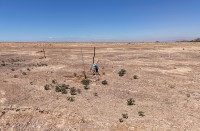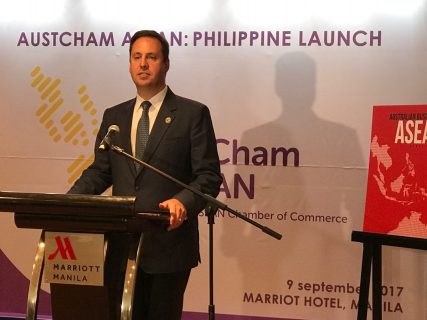
(Eagle News) — Australian Minister for Trade, Tourism and Investment, Hon. Steven Ciobo MP, officially launched the Australia-ASEAN Chamber of Commerce (AustCham ASEAN) in the Philippines at the Marriott Hotel Manila on September 9, 2017.
AustCham ASEAN is a network of over 3,000 corporate members that will highlight commercial opportunities and improve coordination of Australian business interests with the registered Australian Chambers and business councils from across ASEAN as its membership base, making it a ‘chamber of chambers’.
“I am positive that the integration of Australian businesses, the incorporation of opportunities for greater, in many respects, bilateral and multilateral ties between ASEAN member states and Australia will continue to strengthen in the future,” the Trade Minister said.
In his statement, Hon. Ciobo cited that ASEAN as a bloc is Australia’s third largest trade destination, behind China and the European Union, with two-way trade worth $93 billion in 2016.
The voice of Australian businesses in the region
Aimed at deepening Australian business engagement in the region, AustCham ASEAN’s three main activities are:
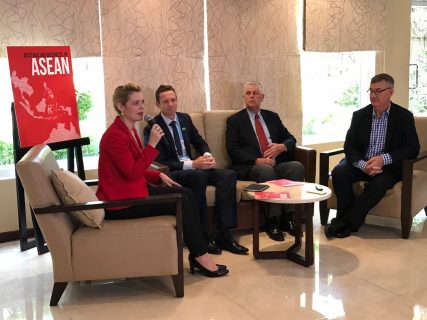
- Informing Australian business on regional integration developments and the business landscape;
- Explaining the contribution of Australian business to ASEAN markets; and
- Advocating for policies, rules, and regulations that support Australian business activities in ASEAN.
“What Australian business never had before was a regional chamber. And that is what AustCham ASEAN is. We are providing a voice to the Australian businesses in the ASEAN level,” Inaugural President of AustCham ASEAN, Mr. Fraser Thompson said.
One of the catalysts resulting in the creation of the regional chamber is the confirmation that regional integration is an important motivation for Australian firms wanting to invest and operate in the region.
“Over half of Australian businesses surveyed indicated that regional integration was one of the key reasons for them to trade and invest in ASEAN – this was the second most important driver after the growing consuming class. However, the survey also indicated a number of gaps inhibiting the operations of Australian firms in the region, from non-tariff measures to infrastructure bottlenecks to restrictions on service offerings. More than half of the Australian firms surveyed indicated that they wanted more information to properly understand what ASEAN regional integration could mean for their business,” the message of AustCham ASEAN President read.
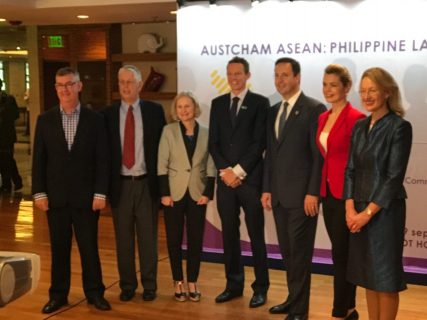
RP: Rock star in the region, but…
“We are in a point where the Philippines is the rock star of the region with its incredible 6% growth, the time to do fundamental reforms is when the economy is doing well because everyone wins,” Tom Grealy, President of the Australia-New Zealand Chamber of Commerce (ANZCham) suggested.
“There’s a whole list of restrictions in the Philippines on foreign investments,” Grealy remarked. This includes the “restrictions on professional services such as the right of foreign engineers to work here.”
“When I think of President Duterte’s priorities – Build, Build, Build – the concern has always been that everything is moving too slow or is going to move too slow,” Grealy noted.
He mentioned that while everyone supports the infrastructure projects of the Duterte administration, there is a need for support from foreign companies. Grealy boasted of Australia having the best global consulting engineering companies in the world. “They are in the Philippines and employ many Filipinos but they have the restrictions in their ability to bring in foreign employees to work on projects,” he noted.
The ANZCham President also hinted that in previous meetings, the adjustment of the foreign ownership cap was floated which also poses as an investment restriction.
On the other hand, the AustCham ASEAN president, Fraser Thompon identified that the sectors of professional services, ICT and financial services “have been called in the survey as problematic and these three areas will be useful for us to start on this journey.”
Top 3 Challenges and Reasons
A key AustCham ASEAN activity was the launch of the results of the Australian Business in ASEAN Survey 2017.
Australian Trade Minister Ciobo said that “it represents a level of aspiration about where we can take this relationship.”
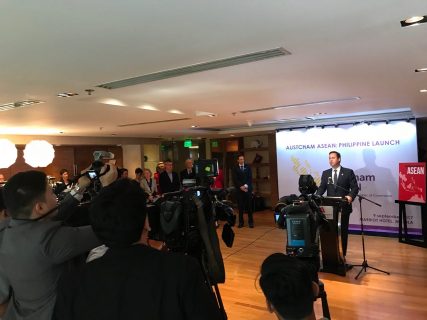
“To be able to understand that people are very keen to pick up on economic opportunity and to understand the strong complementarities that exist is really quite inspiring,” he added.
“If I look at the opportunities around global value chains and the opportunity to be able to build supply that recognizes various competitive strengths and comparative advantages that countries have and how we can work together to make this whole region mutually beneficial is what lies at the core of this document,” the trade minister stressed.
The survey identified the top three reasons for expanding trade and investment in ASEAN: 1) growing consumer class (61%) 2) improvement in infrastructure and 3) regional integration.
Corruption, barriers to ownership and investment and lack of access to skilled labor were the top three roadblocks for Australian companies in operating their businesses in the ASEAN region.
(CRV, Eagle News Service)



